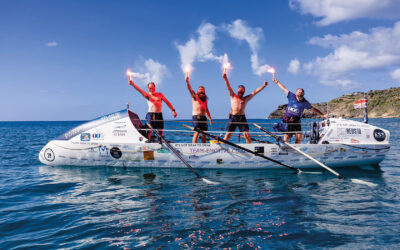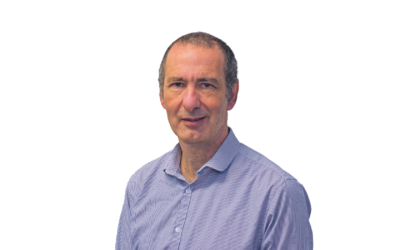To the familiar refrain of ‘Scotland the Brave’, a young bagpiper plays his tune with guests clapping loudly as he parades out of the hotel banqueting room. Behind him, carrying a ceremonial plated haggis and wearing green ‘Modern Gordon’ tartan, is Gordon McInally.
This is the back yard of the new President of Rotary International; Galashiels in the Scottish Borders, close to his home in Yetholm, near Kelso, and he is in his element with friends.
Listen to this article
The occasion is Burns Night, a cultural classic filled with folk music, wee drams of whisky, enthusiastic renditions of the songs and poems of Scotland’s greatest poet, Robert Burns, and, of course, peppery haggis with neeps and tatties (swede and potatoes). It is quintessential Scottish.
Heather McInally, Gordon’s wife of 42 years, is wearing a sash of Rotary tartan-check colours of greens, light blue and dark red. A classically trained professional opera singer and music teacher, she belts out the songs of Burns learnt from childhood with her Scots brogue, rolling her r’s with punch and panache.
Now the haggis is something else. It is made of a sheep’s pluck – heart, liver and lungs – minced with onions, oatmeal, suet, salt and spices, mixed with stock, and then, originally, boiled in the animal’s stomach for an hour.
It sounds like a culinary nightmare, but on their travels the McInally’s have been spreading word of the haggis’s appeal to the Rotary community.
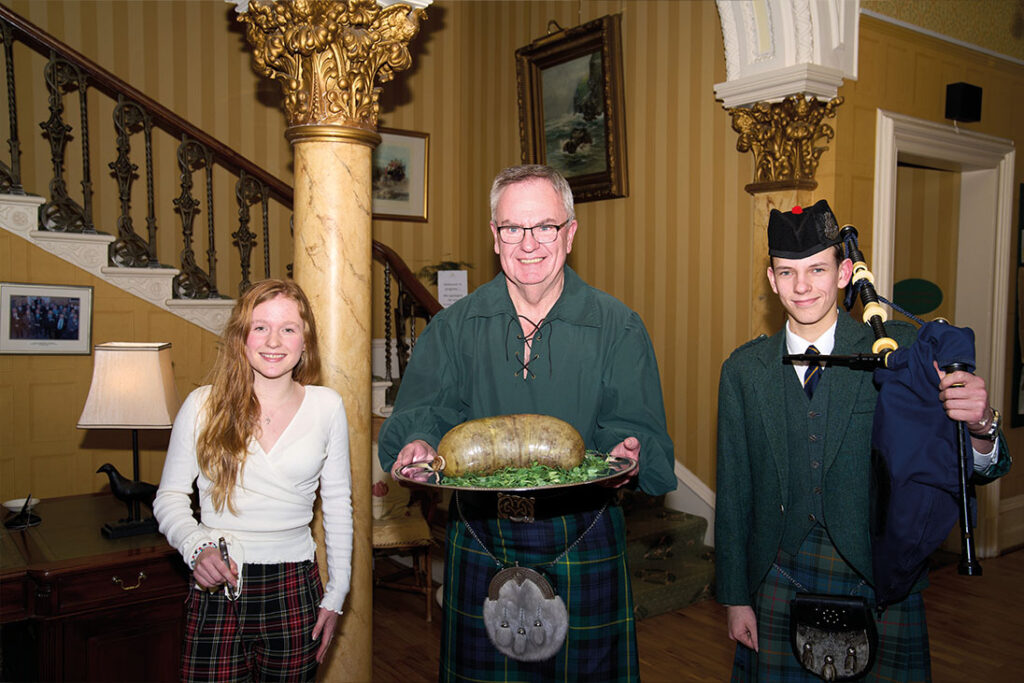

Gordon McInally carrying in the ceremonial haggis at a Burns Night celebration in Galashiels.
Heather explains how, on their visits to the States, they have sourced local supplies of haggis and even warmed up the Scottish delicacy in their hotel room microwave. “The smell of haggis lingered in the room the entire week,” she recalls.
“We served it to other RI Board members while in Chicago. Everyone seems to love it, even though they were not quite sure what they were eating.”
Heather and Gordon are childhood sweethearts who attended separate schools in Edinburgh. It was on a music trip to Florence, Italy, that their relationship blossomed.
What was Heather’s first impression of Gordon? “I couldn’t stand him,” she says, with a gleam in her eye.
“We’re not in each other’s pockets, we do our own thing,” adds Heather. “Even with Rotary, I belong to the Borderlands Passport Club and Gordon is a member of South Queensferry.
“Our lives have always worked like that, largely due to work commitments, where we go off in different directions. We’re both independent people, but we always come home at night and tell each other what we’ve been doing.
“We’ve known each other for 48 years, so you could say we’ve been around the block a few times.”
Gordon agrees. The couple have two daughters, Rebecca and Sarah, and two grandchildren, Ivy and Florence. He describes Heather as “a very, very tolerant lady who has been a great support to me over the years”.
He adds: “She’s always a good sounding board. I can always rely on Heather to tell me as it is.
“If I give a presentation, everyone’s going to tell me it was great, but Heather will always tell me the truth! I know I couldn’t do this job without her support.”
We served it to other RI Board members while in Chicago. Everyone seems to love it, even though they were not quite sure what they were eating.”
For Gordon, this is a night off, listening to youngsters from the Galashiels’ schools deliver a series of dramatic recitations of Burns’ works, including the ‘Address to a Haggis’ by young Poppy Lunn, who then theatrically cuts it open.
There’s more pipe music and fiddle playing, plus community singing, rounded off with a hearty rendition of ‘Auld Lang Syne’.
A few days later, Gordon is at Abbotsford House which towers over the gently-flowing River Tweed near Melrose, right in the heart of Scottish Border country. The countryside is a tapestry of greens, and in the distance loom the three conical peaks of the Eildon Hills, steeped in Roman history.
Abbotsford House was the home of Sir Walter Scott, the novelist, poet and historian, who created the historical novel and counted Queen Victoria among his fans. Her Majesty stayed at Abbotsford on her first trip to Scotland in 1867 and was so impressed by the building that Balmoral Castle was remodelled in the same style.
Now, Scott’s works such as ‘Ivanhoe’ and ‘Rob Roy’ have been adapted for the big screen.
Scott also influenced fashion trends in the 19th century by popularising the wearing of tartan – previously, anyone seen wearing tartan south of the Highlands was regarded as preparing for battle!
Today, the 19th century Scots Baronial building with its crow-stepped gables, ‘pepper-pot’ bartizans and elements taken from old castle and towerhouses in Scotland, is shut to the public for the Winter.
Dust sheets hang over the furniture, and one poor soul is in the middle of cleaning the 9,000 books which line the shelves of the library.
“We’re probably about half an hour from my home, and this is a go-to destination whenever we have visitors,” explains Gordon.
“It’s a beautiful spot, with the River Tweed running behind us, and its links with Sir Walter Scott, one of Scotland’s greatest novelists who, incidentally, went to the same school as me in Edinburgh – but not at the same time, of course!”
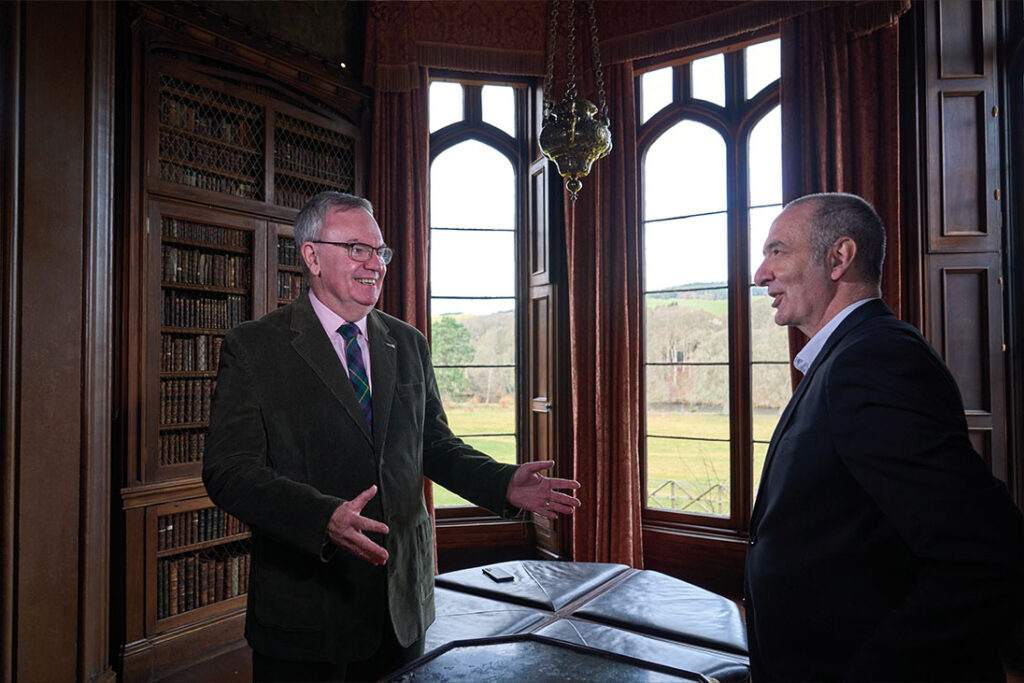

Gordon in conversation with Rotary Editor Dave King.
Of even greater significance for the photoshoot location was that from the age of 18 months old, Scott suffered from polio. He was paralysed in the right leg, and so his parents sent him to recover at his grandfather’s farm in nearby Kelso.
Gordon is chatting to Mary Kenny, Abbotsford House’s heritage engagement officer, and both agree that the celebrated author would have been a good Rotarian, given his high ethical stance as a lawyer and judge, together with his caring nature for his friends and employees.
“It was because of polio that Sir Walter was brought to the Borders where he heard the stories and songs which would inspire his writing,” explains Mary.
With his theme of ‘Create Hope in the World’, Gordon is adamant that Rotary needs to finish the job of creating a polio-free world. Speaking at the Rotary International Assembly in Orlando earlier this year, he told delegates that with more polio cases emerging globally, it was more crucial than ever for Rotarians to lead the fight against the disease.
At that assembly, Gordon spoke for the first time about the suicide of his brother, Ian, who died eight years ago. Reflecting on that speech, at Abbotsford, he said the feedback had been amazing.
“I wasn’t seeking their sympathy, I simply wanted people to know that it could happen to anybody. A number of people came up to me afterwards and said ‘your story is very similar to mine’.
“So, I think in talking about mental health and for Rotary to work towards improving mental health services, it is about stripping away the stigma and being prepared to get the subject out there.
“I might tell you, it was not an easy presentation to give. It was the first time I had ever been able to get through it without breaking down at the end.
“The one reason I wanted to tell that story in Orlando was to let people know mental health issues can impact anyone.
“I felt it was an important story to tell to illustrate why I feel so strongly about this subject.
“My call to action in this new initiative for Rotary is that we advocate for removal of the stigma of talking about mental health, help people to find better quality care, and also support them through their journey to recovery.”
As he looks out through the stainedglass windows, Gordon talks about his love of the Scottish Borders and why, whenever he comes home from trips abroad, he can feel himself relaxing to the point he is convinced his blood pressure drops.
We’re probably about half an hour from my home, and this is a go-to destination whenever we have visitors.”
After living for many years in South Queensferry, near Edinburgh where he worked as a dentist, Heather and Gordon chose to relocate five years ago to the area. Do they miss the city? Not one little bit.
“This is a very agricultural part of Scotland with gentle, rolling hills.
“We’re only an hour from Edinburgh, but this is a part of Scotland which people very often pass by.
“Heather and I have lived here now for the past five years, but it was a relocation that was over 30 years in the planning. All the time I was working as a dentist, we said it would be nice to ultimately make our home in the Borders, because it’s where my forebears came from. My mother’s family were farmers, and my mother was born on a farm about 15 miles from here.
“I’ve said to people since we came here that I feel as if my DNA has come home; I really do feel at home in the Scottish Borders. That may be a rather romantic notion, which brings us back nicely to Walter Scott, who was great romantic poet and novelist.”
Many Rotarians expected the brand themes for this Rotary year to be wrapped around tartan. But Gordon has strayed away from what he describes as “tartan tat” to present a modern look for his year which will resonate with Rotarians around the globe.
The big talking point in Scotland currently is independence from the United Kingdom. A referendum nine years ago delivered a ‘no’ vote, but talk refuses to go away.
Asked what it is to be Scottish, Gordon answers: “The great thing about being Scottish is that you can identify with this small nation, Scotland, but also recognise that we’re part of a larger nation, the United Kingdom.
“I describe myself as a nationalistic Scot, but not a Scottish Nationalist. I am a very proud Scot. In Rotary, I walk under the Saltire, not the Union Flag. I also believe that Scotland, England, Northern Ireland and Wales should remain as the United Kingdom. But that’s just my personal view, I don’t want to get political over it.”
If there is one passion which unites Border folk, then it’s rugby. Although the population of the region is only 100,000, its unique cauldron of local rivalries has produced some of the best rugby players to come out of Scotland, many of whom who have gone on to play for the revered British Lions.
Once the photo call at Abbotsford House is out of the way, the next stop is Kelso Rugby Club for their local derby with Gala in the Tennent’s National League 1. Joining Gordon and Heather for
a pre-match meal of lentil soup followed by steak pie are six friends from the South Queensferry and Borderlands Passport Rotary Clubs.
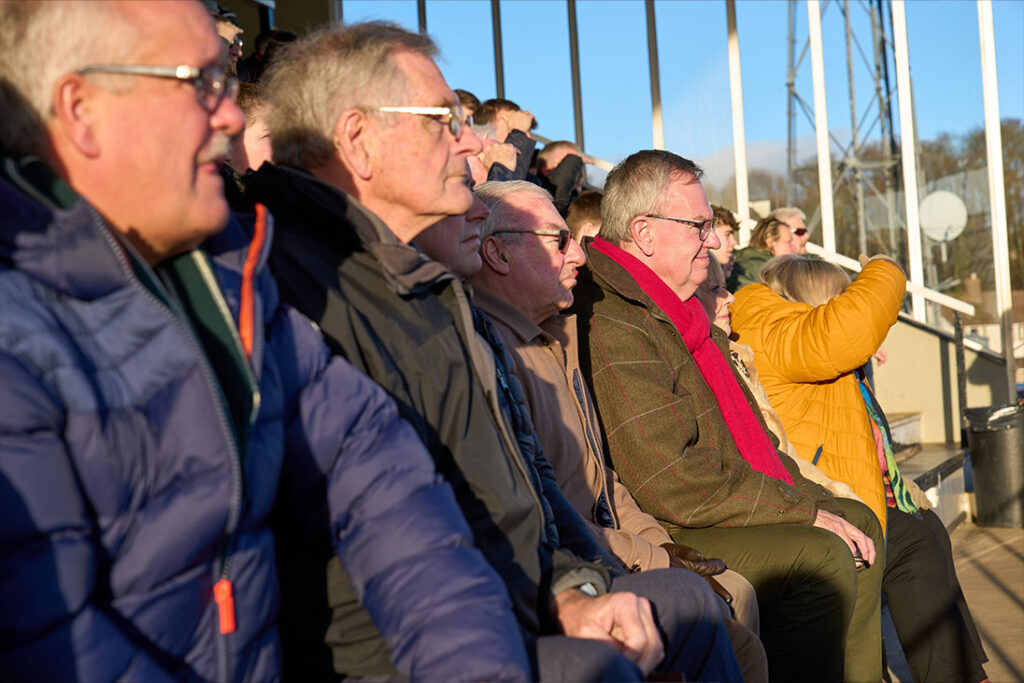

Gordon and his friends engrossed in a game of rugby at Kelso Rugby Club.
The conversation is rich and the laughter frequent, with friends catching up on the latest news.
As a former policeman, Doug Forsyth, has good instincts and he took the opportunity to approach Kelso Rugby Club President, Neil Hastie, about joining the new Borderlands Passport Rotary Club.
“Neil is someone who knows what Rotary is about in the community, but he likes the flexible approach of the Passport Club,” says Doug. “We don’t have weekly meetings, we don’t have meals. We meet maybe once a month for a coffee and a scone and we do projects.
“At the moment, we’re working on a project collecting old spectacles and sending them to a Rotary club in the Philippines which we have partnered with.
“We’re here to do Rotary, not talk Rotary. We’re all about making Rotary active and attractive.”
Gordon, who has been in Rotary since 1984 and is a past President of Rotary in Great Britain & Ireland, looks on approvingly.
“This is flexible Rotary and this is the future,” he adds. “I’d like to think that Rotary has begun to move forward to be a more modern organisation. We’re changing the way we meet, we’re changing the way we dress for meetings, we are people of action.
“And that’s so important. It’s not simply about meeting for meetings’ sake. It’s about doing things. So many new styles of clubs are springing up. I want to see Rotary everywhere, in a style to suit everyone who wants to be part of us.
“So, if you want to be part of a traditional Rotary club, and that Rotary club is successful, that’s fine. But if you want to be part of a club that meets, say, on a Saturday morning for bacon rolls and coffee, that’s fine too. And we need to make that choice available to everybody.”
Around the table, there’s widespread admiration for the man who will become President of Rotary International – only the second Scot, and the fifth from Great Britain & Ireland.
Out of earshot, Sandy McKenzie, President of Gordon’s club at South Queensferry, insists they are very proud of the achievement. “We are absolutely delighted. Gordon is a down to earth,
coal-face Rotarian. He is a man with his feet on the ground.”
So many new styles of clubs are springing up. I want to see Rotary everywhere, in a style to suit everyone who wants to be part of us.”
Club colleague, Kate Gibb, reveals how she always knew her good friend of almost 30 years would reach the pinnacle of Rotary International. “I remember telling our Minister, David Cameron – not the old Prime Minister – that he would be Rotary International President one day. Call it instinct. Gordon is self-effacing, humble and hard-working.”
Gordon was a Second Row forward and Number 8 in his rugby playing days – “a promising career cut short by a severe lack of talent”, he concedes.
At Kelso Rugby Club with his friends, he later watches the match from the stands wedged on the front row between boisterous fans of both teams. It’s a fast and flowing match with plenty of tries, and plenty of good-humoured advice being dished out by the spectators.
Rugby is a big part of the family’s life. Heather recalls one occasion when the television cameras were at Kelso and they homed in on daughter Sarah, then a toddler, who was with Gordon watching a match.
“Aye, they start them young in the Borders,” sang the lyrical tones of legendary BBC rugby commentator, Bill McLaren.
Gordon’s dental practice, where he was a dentist for 36 years, is just a drop kick from the Murrayfield Rugby Ground.
When he sold the practice in 2016, one condition was that he had permission to park there for Scotland internationals!
One of the sacrifices this past year of being President-Elect and the coming year of being President, is that Gordon and Heather will miss Scotland’s Six Nations and other home internationals where they have debenture tickets at Murrayfield.
Gala steal victory over Kelso, 36-31, with two late penalties. As we’re getting ready to leave the ground, Heather notes: “Gordon jokes in his speeches how he is waiting for someone from the Nominating Committee for RI President to come along and say ‘sorry, we called the wrong person with the invitation to be President. We meant to call the next person on the list!’
“It is such an honour. We’re meeting Presidents of countries, visiting glamorous places and I’m pinching myself thinking ‘I am just Heather, what on earth are we doing here?’. We’re from a small village in Scotland of 500 people and here we are representing Rotary International.”
But you must be immensely proud of Gordon for what he has achieved, is the parting question: “Of course,” says Heather, “but please don’t tell him that!”
You can now watch Dave King’s full interview with Gordon McInally on the Rotary GB&I YouTube Channel.
Photos by Peter Croan.









